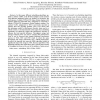Free Online Productivity Tools
i2Speak
i2Symbol
i2OCR
iTex2Img
iWeb2Print
iWeb2Shot
i2Type
iPdf2Split
iPdf2Merge
i2Bopomofo
i2Arabic
i2Style
i2Image
i2PDF
iLatex2Rtf
Sci2ools
115
click to vote
VTC
2006
IEEE
2006
IEEE
Scheduling in Cellular CDMA-TDD Networks
Abstract— In this paper different scheduling algorithms applied to cellular CDMA (code division multiple access) systems with different duplexing modes are studied. In particular, the performance of cellular CDMA-TDD (time division duplex) with random uplink (UL)/downlink (DL) assignment is compared to cellular CDMA-FDD (frequency division duplex) systems. The random UL/DL assignment in TDD is previously reported as random time slot opposing (RTSO), and it was shown that this technique results in interference diversity when used in a cellular system. It is demonstrated in this paper that scheduling algorithms can effectively exploit this interference diversity to enhance the total spectral efficiency. Throughput, outage and average transmit power are used to compare the performance. First, it can be observed that, despite additional interference sources in TDD, TDD and FDD result in about the same throughput and outage performance for a cellular deployment. However, the stepwise rat...
Related Content
| Added | 12 Jun 2010 |
| Updated | 12 Jun 2010 |
| Type | Conference |
| Year | 2006 |
| Where | VTC |
| Authors | Ellina Foutekova, Patrick Agyapong, Birendra Ghimire, Hrishikesh Venkataraman, Harald Haas |
Comments (0)

